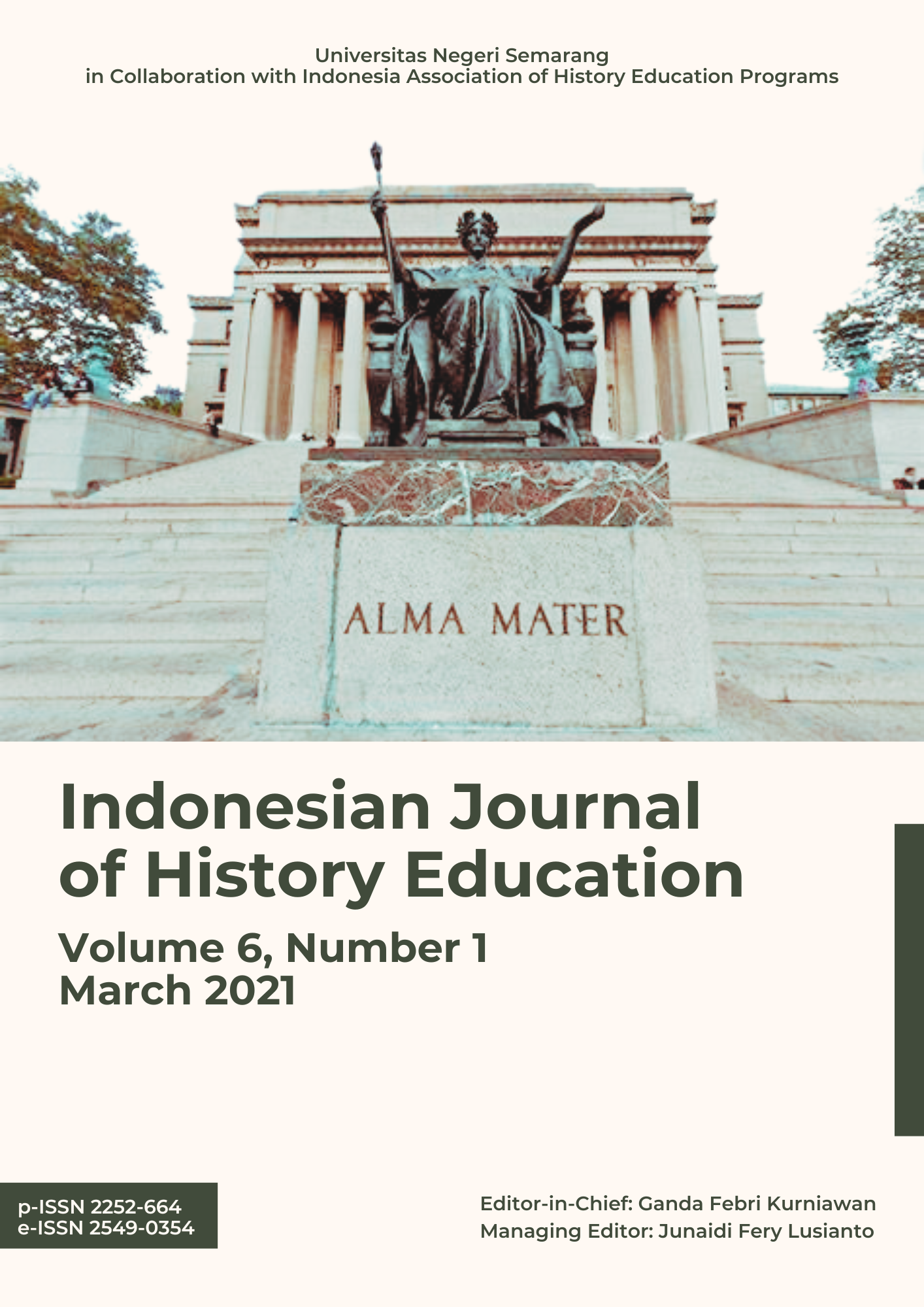Internalization of Socio-Cultural Values Through History Learning in Class X of SMA Semesta Semarang
Abstract
This research aimed to find out and analyze the learning process of history in SMA Semesta Semarang, find out and explore the implementation of socio-cultural values through history learning, and find out and examine the internalization of socio-cultural values in history learning in SMA Semesta Semarang. This method of this research is a descriptive qualitative. The subject of this research was the history teachers of grade X in SMA Semesta Semarang. The data collection was done using observation techniques, interviews, and documentation. In determining the validity of the data, this study used source triangulation. The data analysis technique was an interactive model for data reduction, presentation, and conclusion. The results showed that history learning in SMA Semesta Semarang had been running well. Before starting the learning activities, teachers first prepare a lesson plan. The lesson plan referred to Curriculum 2013. The teachers used the CTL (Contextual Learning) model and the lecturing method in the learning process. The implementation of socio-cultural values through historical learning was done by teachers spontaneously in the learning activities, and it was not written in the lesson plan. Internalization of the values of character education in the learning process was done through the learning activities in or outside the school. The process of internalizing socio-cultural values through the learning activities in the classroom was divided into three stages: Transformation, Transaction, and Trans-internalization. The internalization of socio-cultural values outside of the classroom learning activities was done through various school activities and habituations such as the presence of honest canteens, religious activities, and visiting historical places—keywords: internalization; values; social-culture.
References
Ahyani, N. (2017). Integrasi Pendidikan Karakter Dalam Pembelajaran Sejarah. In PROSIDING SEMINAR NASIONAL PROGRAM PASCASARJANA UNIVERSITAS PGRI PALEMBANG.
Aini, D. N. (2018). Pengaruh budaya literasi dalam mengembangkan kecerdasan kewarganegaraan. Biormatika: Jurnal ilmiah fakultas keguruan dan ilmu pendidikan, 4(01).
Amar, S., & Rahmawati, B. F. (2017). Evaluasi Pembelajaran Sejarah, Universitas Negeri Yogyakarta.
Amin, S. (2010). Pewarisan nilai sejarah lokal melalui pembelajaran sejarah jalur formal dan informal pada siswa sma di Kudus Kulon (Doctoral dissertation, UNS (Sebelas Maret University)).
Atno, A. (2010). Meningkatkan Hasil Belajar Sejarah Siswa Melalui Pendekatan Pembelajaran Kontekstual Dengan Media VCD Pembelajaran. Paramita: Historical Studies Journal, 20(1).
Azimah, N. (2013). KOMPETENSI GURU DI MADRASAH ALIYAH NEGERI 2 MODEL PEKANBARU (Doctoral dissertation, Universitas Islam Negeri Sultan Syarif Kasim Riau).
Faiza, A., & Firda, S. J. (2018). Arus metamorfosa milenial. Penerbit Ernest.
Gustam, R. R. (2015). Karakteristik Media Sosial dalam Membentuk Budaya Populer Korean Pop di Kalangan Komunitas Samarinda dan Balikpapan. E-Journal Ilmu Komunikasi, 3(2), 224-242.
Habibah, N. (2018). Strategi Guru Al-Qur’an Hadits Dalam Mengatasi Kesulitan Belajar Membaca Al-Qur’an Kelas Vii A Di Mts Pp. Tarbiyah Islamiyah Hajoran Kabupaten Labuhan Batu Selatan (Doctoral dissertation, Universitas Islam Negeri Sumatera Utara).
Irawati, D., & Martanti, D. E. (2018). Transparansi pengelolaan laporan keuangan bumdes terhadap pelaporan aset desa (Studi fenomenologi pada BUMDes Desa Karangbendo Kec Ponggok Kab Blitar). UNEJ e-Proceeding, 41-51.
Kurniawati, J., & Baroroh, S. (2016). Literasi media digital mahasiswa universitas muhammadiyah bengkulu. Jurnal komunikator, 8(2), 51-66.
Latifah, S. (2014). Integrasi pendidikan karakter dalam pembelajaran di sekolah. Jurnal ilmiah pendidikan fisika AL-Biruni, 3(2), 24-40.
Nurdiani, N. (2014). Teknik sampling snowball dalam penelitian lapangan. ComTech: Computer, Mathematics and Engineering Applications, 5(2), 1110–1118.
Oktarosada, D. (2017). Implementasi pendidikan karakter pada pembelajaran pendidikan agama islam di kelas X: Studi kasus di SMK Muhammadiyah 2 kalirejo (Doctoral dissertation, UIN Raden Intan Lampung).
Prihatin, E., & Dwimawanti, I. H. (2020). Collaborative governance dalam mengatasi kenakalan remaja di Kabupaten Tegal. Journal of Public Policy and Management Review, 9(2), 54-70.
Rahardi, N., & Wiliasih, R. (2016). Analisis faktor-faktor yang mempengaruhi preferensi konsumen terhadap hotel syariah. Jurnal syarikah: jurnal ekonomi islam, 2(1).
Rony, R., & Jariyah, S. A. (2020). Urgensi Pendidikan Karakter dalam Membentuk Akhlak Peserta Didik. Takfir: Interdisciplinary Journal of Islamic Education, 1(1), 79-100.
Rukajat, A. (2018). Pendekatan penelitian kualitatif (Qualitative research approach). Deepublish.
Sari, M., & Asmendri, A. (2020). Penelitian kepustakaan (library research) dalam penelitian pendidikan IPA. Natural Science, 6(1), 41-53.
Salsabila, U. H., Hutami, A. S., Fakhiratunnisa, S. A., Ramadhani, W., & Silvira, Y. (2020). Peran Pendidikan Islam terhadap Pembentukan Karakter Disiplin Peserta Didik. Intelektual: Jurnal Pendidikan dan Studi Keislaman, 10(3), 329-343.
Sayidah, N. (2018). Metodologi penelitian disertai dengan contoh penerapannya dalam penelitian. Zifatama Jawara.
Subadi, T. (2006). Metode penelitian kualitatif, Surakarta: Muhammadiyah University Press.
Syarbini, A. (2014). Model pendidikan karakter dalam keluarga. Elex Media Komputindo.
Widiantoro, A. (2019). Internalisasi Nilai-Nilai Pendidikan Akhlak Tasawuf Dalam Pementasan Wayang Kulit Lakon Dewa Ruci (Studi Kasus Di Paguyuban Wayang Kulit Ngudi Laras Cepoko Ngrayun Ponorogo) (Doctoral dissertation, IAIN Ponorogo).
Widya, T. S., Zamroni, Z., & Zuchdi, D. (2014). Internalisasi dan aktualisasi nilai-nilai karakter pada siswa SMP dalam perspektif fenomenologis. Jurnal Pembangunan Pendidikan: Fondasi dan Aplikasi, 2(2).
Copyright (c) 2021 Indonesian Journal of History Education

This work is licensed under a Creative Commons Attribution 4.0 International License.
Copyright Notice
An author who publishes in the Jurnal Indonesian Journal of History Education agrees to the following terms:
- Author retains the copyright and grants the journal the right of first publication of the work simultaneously licensed under the Creative Commons Attribution-ShareAlike 4.0 License that allows others to share the work with an acknowledgement of the work's authorship and initial publication in this journal
- Author is able to enter into separate, additional contractual arrangements for the non-exclusive distribution of the journal's published version of the work (e.g., post it to an institutional repository or publish it in a book) with the acknowledgement of its initial publication in this journal.
- Author is permitted and encouraged to post his/her work online (e.g., in institutional repositories or on their website) prior to and during the submission process, as it can lead to productive exchanges, as well as earlier and greater citation of the published work (See The Effect of Open Access).
Read more about the Creative Commons Attribution-ShareAlike 4.0 Licence here: https://creativecommons.org/licenses/by-sa/4.0/.




